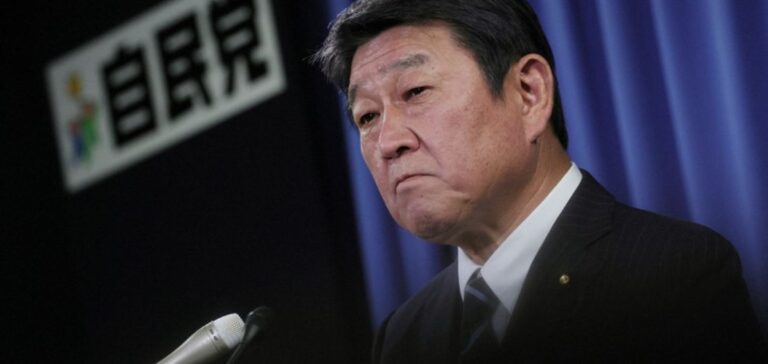The discharge of water from the accident-stricken Fukushima nuclear power plant into the Pacific Ocean is set to begin on Thursday, Japan’s prime minister said on Tuesday, triggering the anger of China, which summoned the Japanese ambassador.
Fukushima water discharge and Chinese reaction
This process was validated in early July by the International Atomic Energy Agency (IAEA), and Tokyo assures us that it will be safe for the environment and human health. But the operation, which is set to last decades, is arousing considerable concern and criticism, particularly from China.
“Vice Foreign Minister Sun Weidong summoned Japan’s ambassador to China, Hideo Tarumi, to make a solemn statement after Tokyo announced that it will begin discharging water from the affected Fukushima plant into the Pacific Ocean this week,” according to a Foreign Ministry statement.
“The ocean is the property of all mankind, not a place where Japan can arbitrarily dump contaminated water,” Wang Wenbin, a spokesman for Chinese diplomacy, told reporters on Tuesday.
Last month, Beijing banned food imports from ten Japanese counties, including Fukushima, and is carrying out radiation tests on food from the rest of the country.
Water discharge details and environmental concerns
Hong Kong also decided on Tuesday to “immediately” ban seafood imports from ten Japanese departments. Tokyo plans to discharge over 1.3 million m3 of water from the Fukushima Daiichi power plant into the sea. This water comes from rainwater, groundwater and the injections needed to cool the reactor cores. These reactors went into meltdown after the tsunami of March 2011. The tsunami devastated the country’s northeast coast. The water was pre-treated to remove radioactive substances, with the exception of tritium, which could not be removed using existing technologies. Only highly concentrated doses of tritium are harmful to health, according to experts. Tepco, the operator of the Fukushima power plant, therefore plans to discharge a maximum of 500,000 liters per day into the ocean until the early 2050s, with dilution to reduce the level of radioactivity in the tritiated water to well below national standards for this category.
Japanese insurance, IAEA monitoring and Greenpeace criticism
Japan therefore asserts that this operation poses no threat to the marine environment or human health. The IAEA, which oversees the project, agrees and gave the green light in July. The operation will begin on Thursday “weather conditions permitting”, according to Japanese Prime Minister Fumio Kishida.
IAEA personnel are working on site to ensure that the project “remains compliant with safety standards” and will provide the international community with “real-time and near-real-time” monitoring data, the agency said in a statement on Tuesday. Tepco and the Japanese Fisheries Agency will also be putting monitoring data online.
“The Japanese government has opted for a false solution – decades of deliberate radioactive pollution in the marine environment – at a time when the world’s oceans are already under high stress,” denounced Greenpeace in a statement on Tuesday.
Japanese fishing industry’s concerns and the government’s response
The Japanese fishing industry fears adverse consequences for the image of its products. She fears this will affect the perception of consumers in Japan and abroad.
“We are still opposed to the release of water” because “scientific safety does not necessarily equate to a sense of safety in society”, said its representative, Masanobu Sakamoto, on Monday after a meeting with Mr. Kishida.
Japan will call for an end to Chinese trade restrictions, citing “scientific evidence”, said Mr. Kishida on Tuesday.
The latter promised measures to support the Japanese fishing industry. These measures include encouraging domestic production and consumption of its products, as well as opening up new export markets. In addition, a 30 billion yen (190 million euros) fund has been set up to cover the risk of image loss.
Geopolitical tensions: The Chinese angle and regional perspectives
China’s fears may be genuine. However, his vehement tone is probably explained by the geopolitical and economic tensions between Beijing and Tokyo. At least that’s what James Brady, an analyst with research firm Teneo, says.
Beijing can thus “exploit” the Fukushima water issue by trying to “exacerbate” Japan’s internal divisions on the subject, exert “some pressure” on Japanese foreign trade and attempt to disrupt the recent warming of ties between Tokyo and Seoul, believes Mr. Brady, interviewed by AFP.
Taiwan, another major Asian customer of Japanese seafood products, adopted a measured tone on Tuesday, through the spokesman for its foreign minister. He said he “respected” the assessments of international scientific experts on the subject.





















